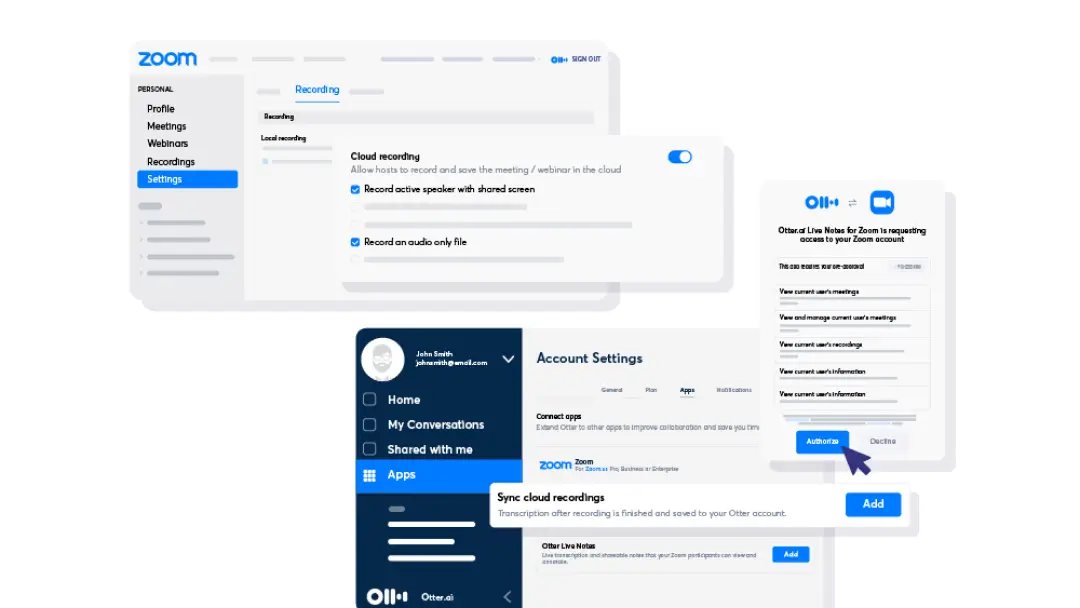How to Conduct a Candidate Interview: 10 Tips and Questions

A well-run candidate interview doesn't just assess skills. It lets you see how someone thinks, communicates, and fits with your team. And that starts with asking the right questions.
Whether you're a first-time manager or a seasoned recruiter, communication is a key interview skill — and the way you approach the meeting can make or break the candidate’s experience.
Here’s a guide with tips for interviewing someone. We'll walk through key question types, practical strategies you can apply right away, and a simple interview template to guide your next session. Plus, learn how Otter supports the process by recording each conversation and generating clear, searchable transcripts that let you stay fully engaged.
How to interview a candidate: 10 tips
Great interviews happen when you're prepared, focused, and responsive. Here are 10 tips for approaching interviews with clarity and confidence:
1. Prepare beforehand
Review the candidate’s resume, portfolio, and any notes from previous interviews. Identify gaps or topics worth exploring. This gives you the insights you need to ask more insightful questions, and it shows the candidate you care. And with Otter, you can easily store and revisit past transcripts to guide your prep.
2. Set a professional tone
Start with a quick introduction and explain how the interview will run. With clear expectations, the candidate can relax and you can maintain a smooth flow.
3. Encourage the STAR method
STAR stands for Situation, Task, Action, and Result. It’s a structure many interviewees use to answer situational questions without missing details. When you give candidates the time and space to answer thoroughly, they gain confidence and show you exactly who they are, leading to a more effective interview. Also ask follow-up questions to clarify any vague responses.
4. Practice active listening
Avoid typing or looking at your notes while the candidate talks. Use Otter instead. Otter automatically transcribes your conversation so you can give your full attention to the conversation. It also helps you maintain eye contact and pick up on subtle cues.
5. Ask a variety of questions
Mix behavioral, competency-based, and situational interview questions to uncover how the candidate approaches challenges and responsibilities. Otter can help track which types of questions you’ve asked across interviews so you don’t repeat any.
6. Make space for candidate questions
Leave time for candidates to ask about the role, team, or company culture. This part of the interview tells you what they value and where they might need more clarity — and you can collect that feedback for future interviews.
7. Stay consistent across interviews
If you're meeting several candidates for the same position, keep the structure similar to avoid confusion and level the playing field. Otter's Meeting Types allow you to use a repeatable format and compare summaries side by side.
8. Listen for red flags
Responses that avoid accountability or show poor communication habits may signal a need for further probing. Ask clarifying questions instead of rushing ahead.
9. Outline the next steps
Be transparent about what comes next. Let candidates know when they’ll hear back and whether there are additional stages in the process. While this doesn’t affect the interview itself, it improves the candidate experience.
10. Review the interview afterward
Once the interview is complete, review the Otter transcript and summary. This gives you access to every detail — especially those you might have missed during the meeting. You can also use Otter AI Chat to quickly find answers to key questions or generate follow-up notes.
15 questions to ask during an interview
Interview questions should encourage candidates to share real experiences and demonstrate how they think. Use a combination of question types to get a fuller view of their skills and mindset.
Here are some effective interview questions to ask:
Behavioral Questions
These uncover how a candidate handled situations in the past, giving you insight into how they might behave on the job.
- Tell me about a time you made a mistake at work. What did you learn?
- Describe a time you led a team under pressure.
- Share a situation where you went above your responsibilities.
- When have you had to adapt quickly to a new process?
- Tell me about a time you gave feedback that led to change.
Competency-Based Questions
These focus on the candidate’s abilities and how they approach their work. They also identify weaknesses in a candidate's skill set.
- What’s one skill area you’re working on?
- How do you stay organized when managing multiple tasks?
- Describe how you learn new tools or systems.
- How do you prioritize your responsibilities?
- What strategies help you collaborate with others?
Situational Questions
Situational questions test the candidate’s judgment and approach to future scenarios.
- What would you do if a coworker missed a deadline that affected your work?
- How would you handle a disagreement with a supervisor?
- What steps would you take if you were assigned unclear tasks?
- How would you respond if a client questioned your expertise?
- What would you do if a team project started falling behind?
The more questions you ask, the harder they are to track. The good news is that Otter AI Chat allows you to revisit each response at any time. You can even ask, "What did the candidate say about conflict resolution?" and get an instant, clear summary.
3 questions to avoid during candidate interviews
Some questions may feel conversational but cross professional or legal boundaries. Interview techniques for employers include avoiding asking interview questions that could be considered biased, irrelevant, or invasive. Focus on relevant questions that align with the role’s requirements and let the candidate show their experience and thinking.
Here’s a quick look at what to avoid in the hiring process:
1. Discriminatory questions
Don’t ask questions about someone’s age, religion, marital status, or plans to have children. These questions can create legal risks and don’t reflect a candidate’s qualifications.
Example to avoid: “Do you have plans to start a family soon?”
2. Personal or impolite questions
Even casual comments about appearance, political views, or family life can feel intrusive in a job interview, and they’re almost never relevant.
Example to avoid: “What’s your ethnic background?”
3. Irrelevant or hypothetical questions
Avoid trick questions or abstract hypotheticals that don't reflect the job. These rarely lead to useful insights.
Example to avoid: “If you were an animal, what would you be?”
Candidate interview template
Use this flexible structure to guide your next interview:
- Greeting and introduction: Welcome the candidate, introduce yourself, and set expectations for the interview.
- Role overview: Share details about the role, team, and goals. Let the candidate know what success looks like in this position.
- Candidate background: Ask the candidate to walk you through their experience and explain how it connects to the job.
- Core interview questions: Use a mix of behavioral, competency-based, and situational questions. Keep your questions relevant and open-ended.
- Candidate questions: Encourage them to ask about the company culture, team, or challenges they might face in the role.
- Next steps and wrap-up: Explain what comes next in your hiring process. Thank them for their time and interest.
Otter’s Meeting Types can help you apply the same format across different candidates while customizing the best interview questions for each role.
Streamline your interview process with Otter
Interviewing is more effective when you can stay present and listen closely. With Otter, you never have to worry about missing a detail. Otter records and transcribes interviews in real-time, then organizes everything into a professional transcript you can search, edit, and share.
You can also use Otter Meeting Types to create repeatable interview structures and automatically generate summaries and action items. Plus, ask Otter AI Chat for a recap of the candidate’s answers on specific topics.
Try Otter today to streamline your process and move quickly when the right candidate comes along.




















